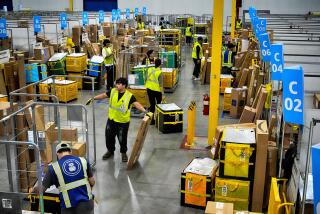Experts Fear Economy May Turn Sour in ’89
- Share via
WASHINGTON — While the Republicans almost certainly will be blessed with a buoyant economy through Election Day, inflation and rising interest rates could shove the country into a recession as early as next spring, some economists are warning.
A few analysts are forecasting a downturn for next year, and many who aren’t say it will take luck to avoid a recession.
Ironically, one of the things that has them worried is that economic growth has been so robust lately.
A boom in U.S. export sales has helped push the nation’s unemployment rate down to 14-year lows.
The gross national product has expanded at an annual rate of 3.1% during the first six months of the year and there are indications that the economy may be growing even faster in the current July-September quarter.
This rapid growth in demand is beginning to push up against supply restraints because of tight labor markets and high operating rates in many industries.
Discount Rate Signal
This often translates into rising inflationary pressures as workers demand higher wages and businesses boost product prices.
To nip inflation before it gets out of hand, the Federal Reserve since late March has been pushing up interest rates to dampen demand. Earlier this month, it boosted its discount rate one-half percentage point to 6.5%.
An increase in the discount rate is the most dramatic signal the central bank can send of its inflation fighting intentions.
That is what worries economists. Most recessions in this country are brought on by a credit squeeze.
While the central bank doesn’t set out to create a downturn, it often finds it difficult to walk the fine line between dampening demand to cool inflationary pressures and tightening so much that a new recession is triggered.
“The famous soft-landing for the economy has proven very difficult to manage in the past,” said Robert Dederick, chief economist for the Northern Trust Co. of Chicago.
Dederick said he believed the current expansion, now in its peacetime record 69th month, will head into a new slump by the end of next year.
Economists at the New York investment firm of Merrill Lynch said in their latest forecast that growth could stall by next summer as higher interest rates and a loss of export momentum take their toll.
David Wyss, an economist with Data Resources Inc., said next spring will be the beginning of the danger time for the economy, given the six to nine month lag between increases in interest rates and their greatest impact on borrowing.
“We are forecasting that we will be able to avoid a recession next year and just have a slowdown, but the risk of a recession is certainly there if the Federal Reserve gets carried away with tightening,” he said.
Under some optimistic scenarios, the expansion will moderate as higher interest rates cut into consumer and business demand, but strong export sales will provide a boost to manufacturing and prevent a recession.
Another theory sees inflation rising at a faster clip, forcing the Fed to take stronger action which will send such key interest-rate sensitive sectors as housing into a tailspin, with the weakness then spreading to the rest of the economy.
Resilent Recovery
With mortgage rates climbing lately, the National Association of Home Builders has already complained that the Fed’s credit tightening threatened to make the housing industry a “sacrificial lamb.”
While the Reagan Administration expressed its disappointment at the Fed’s recent discount rate hike, economists said the credit tightening so far should not cause any appreciable slowdown before the Nov. 8 election, good news for GOP presidential candidate George Bush, who hopes continued signs of prosperity will translate into votes.
Michael Penzer, an economist with the Bank of America in San Francisco, said he believed that interest rates would keep rising until next February, when the Fed would reverse course after seeing signs that its tightening was having the desired effect of slowing GNP growth.
Incredible Rebounds
“We have a fairly rosey scenario in which the Fed lucks out,” he said.
Economists who are not ready to write the obituary for the expansion say the current recovery from the 1981-82 downturn has proven remarkably resilient and may have a couple of more years of life.
“This expansion has had nine lives,” said Jerry Jasinowski, chief economist of the National Assn. of Manufacturers. “It has rebounded from a flood of imports in the mid-1980s, high real interest rates and the loss of $1 trillion of wealth during the 1987 stock market collapse.”
More to Read
Get the L.A. Times Politics newsletter
Deeply reported insights into legislation, politics and policy from Sacramento, Washington and beyond. In your inbox twice per week.
You may occasionally receive promotional content from the Los Angeles Times.










